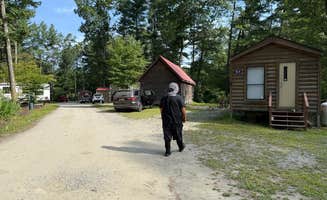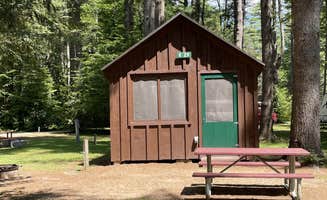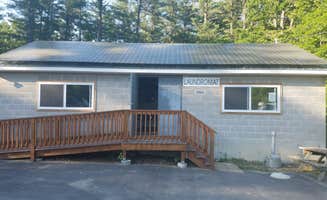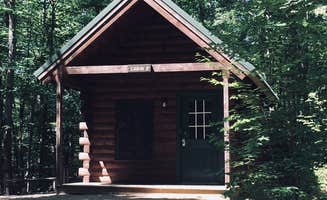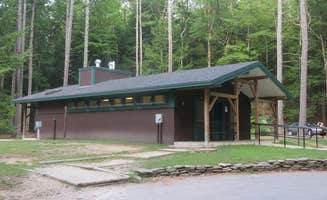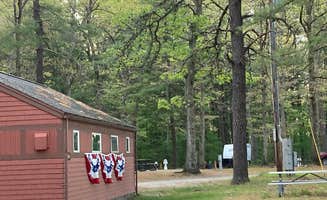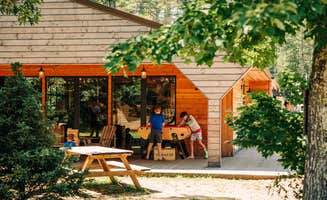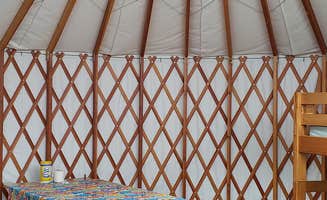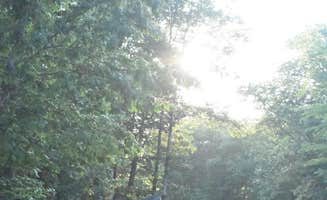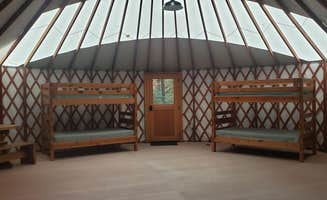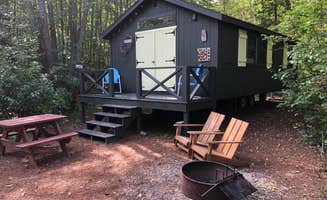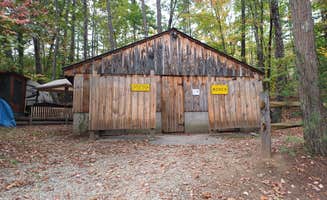South Hampton camping sites nestle along the New Hampshire-Massachusetts border where the terrain transitions from coastal lowlands to gentle hills. The area features a mix of forest, wetland, and pond ecosystems with elevations generally below 300 feet. Most campgrounds operate seasonally from late April through mid-October due to the region's New England climate patterns, with nighttime temperatures that can drop into the 40s even during summer months.
What to do
Mountain biking trails: Bear Brook State Park Campground has extensive trail networks for mountain biking enthusiasts. "We camped here to check out the mountain bike trails in the park and we're not disappointed on either count. The campground is nice and spacious, well kept and the staff is friendly. The biking trails were a blast," notes Eammon C. The park maintains over 40 miles of trails ranging from beginner to advanced levels.
Geocaching adventures: Pawtuckaway State Park Campground offers numerous geocaching opportunities throughout its trail system. The park includes hidden caches that can be tracked with GPS coordinates. "There's at least three campground areas, one of which is on an island and has tent sites along the water... Pretty serious trail up and around some mountains, to a fire tower, ponds," mentions Harry H. Download geocache information before arrival as cell service can be limited.
Fishing access: Several campgrounds provide lake and pond access for fishing. At Hidden Valley RV and Golf Park, campers can fish on the property. "Fishing and swimming on property along with a club house," reports Shawn C. The facility offers 1,300 acres with multiple fishing spots and no additional fee for registered campers.
What campers like
Spacious wooded sites: Wakeda Campground features large sites set among mature pine forests. "We were overwhelmed by the beautiful massive forest. The campground was splendid with old tall, pine trees everywhere," writes Pawsfuradventure T. Sites are situated to maximize privacy while still offering convenience to facilities. According to Martin S., the spots are "quite big but secluded at the same time."
Wildlife viewing: Cape Ann Camp Site provides opportunities to observe local wildlife in their natural habitat. "Spectacular views and wild turkeys, deer, etc," notes John S. The campground's layout preserves natural habitats while accommodating campers. Ron C. adds that the campsite was "clean & secluded enough but close enough to others to meet & greet if you wanted."
Beach proximity: Campsites in the region offer convenient access to coastal beaches. The Pines Camping Area sits within a short drive of beaches. "The location is great being 10 minutes or so from Hampton beach. Lots of little farms in the area too," mentions Kris S. from nearby Wakeda Campground. Several campgrounds provide shuttle services to beaches during summer months.
What you should know
Variable bathroom conditions: Bathroom facilities can differ substantially between campgrounds and throughout the season. At Bear Brook State Park Campground, one camper noted, "It was the final weekend of the season, so that may explain the lack of attention to cleaning and upkeep of the restrooms. Several of the stalls were lacking toilet paper and, although it was nearly empty when I arrived, the bathrooms had little bits of debris scattered on floors and around sinks."
Site selection matters: When choosing a campsite, consider specific site numbers and locations carefully. At Pawtuckaway State Park Campground, Ellen C. advises, "In 2013 site 25 was a little challenging since it was on a downgrade and we were hit with an unexpected 36 hour downpour and there was only one suitable spot for our tent since the terrain is very rocky." Elevated sites offer better drainage during rainy periods.
Seasonal ownership impacts: Many campgrounds have a high percentage of seasonal residents. At Tuxbury Pond RV Campground, Betty H. observed, "There are lots of seasonal campers so if you don't like that atmosphere this is probably not the place for you." This affects the social dynamics and availability of weekend spots during peak season.
Tips for camping with families
Playground assessment: When camping with children, playground facilities vary significantly between campgrounds. Calef Lake Camping Area features "a small playground" according to Rhonda B., while Alyse-Beast F. describes it as "absolutely perfect for kids and adults alike." Most playgrounds close at dusk with quiet hours beginning at 9 or 10 PM.
Evening entertainment: Family-friendly activities are offered at several campgrounds. At Tuxbury Pond RV Campground, Sara D. reports, "There was a gentleman that started setting up for a comedy show that they would be doing that night. A staff member came to our site and let us know that there is an 18+ comedy show but there was a children's movie being played on a big screen on the other side of the campground."
Swimming options: Swimming areas range from natural ponds to constructed pools. At Winding River Campground, Lisa H. notes, "River is not much to look at but the pool was great and there were great events like foam parties, DJ at the pool, pancake breakfast and live music to name a few." Most water facilities close by 8 PM with lifeguards present only during designated hours.
Tips from RVers
Site hookup placement: RV sites often have unusual utility placement that requires planning. At Hidden Valley RV and Golf Park, Carry M. found, "The water and electric were between our site and the next on one side and sewer between our site and the one on the other side. This made it difficult to place our trailer on the slanted site and reach all services."
Seasonal sites differ from transient areas: Many campgrounds separate seasonal and transient camping sections. At Sea Coast Camping and RV Resort, Nancy W. observed, "Half of the park is seasonal campers (which is a lot more cramped and more junked up) and the other half is for transients. The two sides are separated by a tree line where the tent sites are located."
Advance reservation timing: For RV sites with full hookups, reservations should be made well in advance. One camper at Cape Ann Camp Site noted they "stayed an extra night" due to site availability, suggesting flexibility outside peak season. Most campgrounds require 50% deposit at time of booking with full payment due 14 days before arrival.


